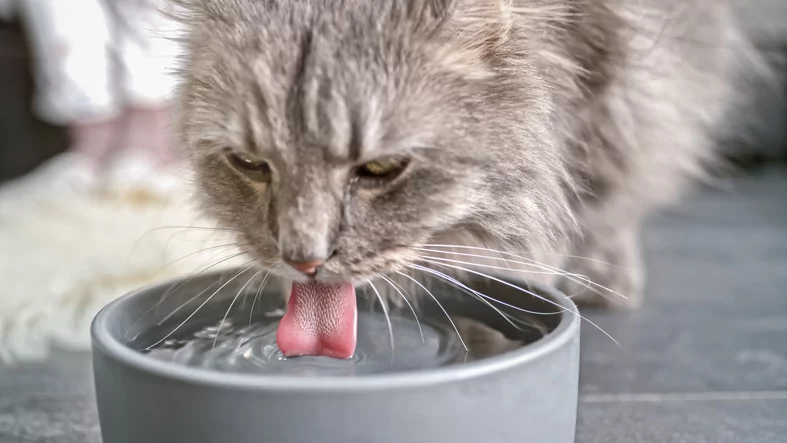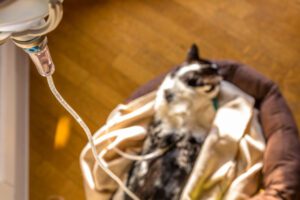Kidney Disease in Cats: Symptoms and Treatments
Has your cat recently been diagnosed with kidney disease, or are you concerned that they could have a kidney disease? What are some of the most common symptoms of kidney disease in cats, and what can be done to treat or manage these conditions?
If you’re asking yourself these questions, you’re not alone. In the article below, you’ll find out more information about symptoms and treatments for kidney disease in cats. With the help of this information, you can choose when to talk to your vet for more information about your individual cat’s needs.
Symptoms of Kidney Disease
- Excessive weight loss: Excessive weight loss without explanation is one of the first signs most cat owners notice in their cats with kidney disease. This symptom may indicate a wide variety of other feline health problems, so it’s important to work with your vet to figure out what’s going on.
- Poor coat health: Poor coat health may indicate several health problems in cats as well. However, when seen with other items on this list, it almost always relates to kidney problems. Poor coat health may include skin infections as well as thinning and patchy hair loss, dandruff, and other symptoms.
- Excessive thirst and urination: Kidney disease typically causes excessive thirst and excessive urination in cats. Urine may or may not contain blood, and it may also be very diluted depending on the severity and stage of the kidney disease. Some cats may yowl in pain when urinating, but others may not, so pain when urinating is not a typical sign of kidney disease in cats.
- Excessive appetite: Cats with kidney disease often have an excessive appetite. If your cat seems to be eating a lot but isn’t gaining any weight, or is still losing weight, then this may be a sign something is wrong with their kidneys.
- Foul breath: Foul breath is another early sign of kidney disease in cats, and it may be one of the first signs you notice in your own cat. This type of bad breath may smell sickeningly sweet, or it might smell like ammonia, depending on the type and severity of the kidney disease.
- Vomiting and diarrhea: Vomiting and diarrhea are secondary symptoms that may or may not be present in cats with kidney disease. However, it is possible that your cat may suffer from these symptoms, which can further increase her risk of dehydration as well.

How it Can Be Treated
There is no one treatment for kidney disease in cats, and it is impossible to completely remove this type of disease from your cat once it has set in. With that said, there are several management solutions that can help your cat deal with this type of disease and extend her life, even when she is facing a kidney disease diagnosis. Your vet can help you make the right decision about which treatment or management may work for your cat.
- Kidney health diet: Several prescription diets are available for cats with kidney disease. These diets contain all the essential nutrients and vitamins your cat needs to help them stay as healthy as possible. Kidney health diets can also replace the nutrients your cat has lost due to their kidney problems.
- Vitamins and supplements: Since your cat is likely lacking in vitamins and nutrients when they are dealing with kidney disease, they will need to be put on supplements to help combat this issue. The right supplements for your cat will vary, so it’s important to work with your vet to figure this out.
- IV fluids: IV fluids are typically required for cats who are suffering from dehydration as a result of kidney disease. Your cat may need IV fluids regularly, or they may only need them every once in a while. Only your vet can tell you for sure how often your cat needs fluids.
- Anemia treatment: If your cat is anemic from their kidney disease, which is quite common, your vet may recommend treating her for the anemia. Handling this part of your cat’s kidney disease may make it easier for their body to cope with the other aspects of this condition.

Conclusion
Kidney disease is unfortunately fairly common in cats. If your cat is diagnosed with early stages of this condition, you may be able to make some changes to their lifestyle and their normal routine to help slow the progression. However, if they have late-stage kidney disease, you may simply need to make them comfortable throughout the rest of their life.
Your vet can help you choose the best course of action for treating or managing your cat’s kidney disease. With the help of a trusted vet, you can provide the best possible care for your cat throughout every stage of this disease.
If you have more questions about your cat’s health, call us today at (662) 234-4336. Here at Bottletree Animal Hospital, we are ready to help you and your cat with whatever their needs may be!
Recent Posts
About Us
Welcome to Bottletree Animal Hospital, your family-friendly veterinarian in Oxford. We are a team of animal lovers who are passionate about veterinary excellence. We love working closely with you and your pet to help us learn more about your furry friend, their lifestyle, and their needs.

